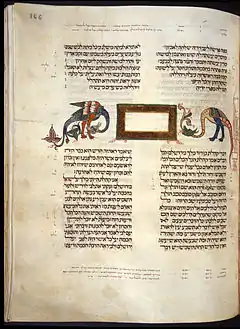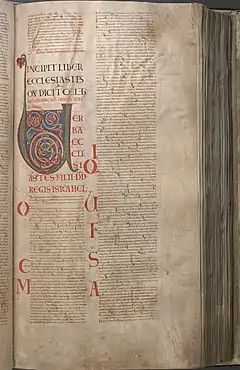Ecclesiastes 1
Ecclesiastes 1 is the first chapter of the Book of Ecclesiastes in the Hebrew Bible or the Old Testament of the Christian Bible.[1][2] The book contains philosophical speeches by a character called Qoheleth (="the Teacher"; Koheleth or Kohelet), composed probably between 5th to 2nd century BCE.[3] Peshitta, Targum, and Talmud attribute the authorship of the book to King Solomon.[4] This chapter contains the title of the book, the exposition of some basic facts and the problem of life, especially the failure of wisdom.[5]
| Ecclesiastes 1 | |
|---|---|
.png.webp) A picture of Solomon holding a flower and of a youth, a miniature from the opening of Ecclesiastes (in Latin) in the Bible of the Monastery of Santa Maria de Alcobaça, c. 1220s (National Library of Portugal ALC.455, fl.207). | |
| Book | Book of Ecclesiastes |
| Category | Ketuvim |
| Christian Bible part | Old Testament |
| Order in the Christian part | 21 |
Text

The original text was written in Hebrew. This chapter is divided into 18 verses.
Textual witnesses
Some early manuscripts containing the text of this chapter in Hebrew are of the Masoretic Text, which includes Codex Leningradensis (1008).[6][lower-alpha 1] Fragments containing parts of this chapter were found among the Dead Sea Scrolls: 4QQohb (4Q110; 30 BCE ‑ 30 CE; extant verses 8-15).[8][9][10]

There is also a translation into Koine Greek known as the Septuagint, made in the last few centuries BCE. Extant ancient manuscripts of the Septuagint version include Codex Vaticanus (B; B; 4th century), Codex Sinaiticus (S; BHK: S; 4th century), and Codex Alexandrinus (A; A; 5th century).[11] The Greek text is probably derived from the work of Aquila of Sinope or his followers.[3]
Title (1:1)
Verse 1
- The words of the Preacher, the son of David, king in Jerusalem.[12]
- "Preacher": "Convener" or "Collector"; Hebrew: קהלת, Qoheleth[13] (so throughout Ecclesiastes),[14] meaning simply "teacher" (a Hebrew participle).[15] Its verbal root qahal means 'to assemble'.[16]
- "The son of David, king in Jerusalem" refers to any king in the line of David ("Davidic King").[16][3] This is picked up in Ecclesiastes 1:12, which states that he ruled "Israel" from Jerusalem; if "Israel" is meant to include the Northern Kingdom of Israel then the only descendants of David to rule it were Solomon or 'far-from-wise Rehoboam'.[3] From the further descriptions in chapter 1 and 2 clearly "Qoheleth" refers to Solomon, although the name 'Solomon' is avoided, not explicitly claimed as in Song 1:1 or Proverbs 1:1.[16]
Some basic facts (1:2–11)

Verse 2
- Vanity of vanities, says the Preacher,
- vanity of vanities! All is vanity.[17]
- "Vanity": the key term of this book[3] is the Hebrew term הבל, hebel,[18] translated "vanity" or "vain", concretely referring to a "mist," "vapor," or "mere breath," metaphorically to 'something that is fleeting or elusive' (with different nuances depending on the context),[19] also can be translated as 'Absurdity, Frustration, Futility, Nonsense.'[20] It appears five times in this verse alone and is found in 29 other verses in Ecclesiastes.[19]
- "Vanity of vanities" (Hebrew: הבל הבלים habel habalim[18]): is the motto which appears again in the end of teaching in Ecclesiastes 12:8.[3]
Verse 3
- What profit has a man from all his labor
- In which he toils under the sun?[21]
This rhetorical question follows the claim of "vanity" and is followed by the portrayal of a world 'impervious to human effort.'[3]
- "Profit" (ESV: "gain"; Hebrew: יתרון, yithron,[22]): a term used in (ancient) commerce.[23]
- Both the noun "labor" and the verb "toil" come from the Hebrew root word amal (עמל, as noun or verb[22]) which may refer to 'physical effort' (cf. Ecclesiastes 2:4–8; Psalm 127:1) or to 'mental and emotional heaviness' (cf. Ecclesiastes 2:3; Psalm 25:18).[23]
The failure of wisdom (1:12–18)
The problems declared in the earlier part are attempted to be solved using 'wisdom', but the conclusion in this part is that wisdom can only enlarge one's view of the problem but does not bring any solution, and the real solution is still to be anticipated.[23]
Notes
- Since 1947 the whole book is missing from Aleppo Codex.[7]
References
- Halley 1965, p. 275.
- Holman Illustrated Bible Handbook. Holman Bible Publishers, Nashville, Tennessee. 2012.
- Weeks 2007, p. 423.
-
 Jastrow, Morris; Margoliouth, David Samuel (1901–1906). "Ecclesiastes, Book of". In Singer, Isidore; et al. (eds.). The Jewish Encyclopedia. New York: Funk & Wagnalls.
Jastrow, Morris; Margoliouth, David Samuel (1901–1906). "Ecclesiastes, Book of". In Singer, Isidore; et al. (eds.). The Jewish Encyclopedia. New York: Funk & Wagnalls. - Eaton 1994, pp. 610-611.
- Würthwein 1995, pp. 35-37.
- P. W. Skehan (2003), "BIBLE (TEXTS)", New Catholic Encyclopedia, 2 (2nd ed.), Gale, pp. 355–362
- Ulrich, Eugene, ed. (2010). The Biblical Qumran Scrolls: Transcriptions and Textual Variants. Brill. pp. 746. ISBN 9789004181830. Retrieved May 15, 2017.CS1 maint: ref=harv (link)
- Dead sea scrolls - Ecclesiastes. Quote: 4QQohb 1:1-14
- Fitzmyer, Joseph A. (2008). A Guide to the Dead Sea Scrolls and Related Literature. Grand Rapids, MI: William B. Eerdmans Publishing Company. p. 43. ISBN 9780802862419. Retrieved February 15, 2019.CS1 maint: ref=harv (link) Quote: 4QQohb 1:10-15.
- Würthwein 1995, pp. 73-74.
- Ecclesiastes 1:1 ESV
- Hebrew Text Analysis: Ecclesiastes 1:1. Biblehub
- Note [a] on Ecclesiastes 1:1 in ESV
- Eaton 1994, p. 610.
- Eaton 1994, p. 609.
- Ecclesiastes 1:2 ESV
- Hebrew Text Analysis: Ecclesiastes 1:2. Biblehub
- Note [a] on Ecclesiastes 1:2 in ESV
- Note [a] on Ecclesiastes 1:2 in NKJV
- Ecclesiastes 1:3 ESV
- Hebrew Text Analysis: Ecclesiastes 1:3. Biblehub
- Eaton 1994, p. 611.
- Ecclesiastes 1:18 NKJV
- Weeks 2007, p. 424.
Sources
- Eaton, Michael A. (1994). "Ecclesiastes". In Carson, D. A.; France, R. T.; Motyer, J. A.; Wenham, G. J. (eds.). New Bible Commentary: 21st Century Edition (4, illustrated, reprint, revised ed.). Inter-Varsity Press. pp. 609–618. ISBN 9780851106489.CS1 maint: ref=harv (link)
- Halley, Henry H. (1965). Halley's Bible Handbook: an abbreviated Bible commentary (24th (revised) ed.). Zondervan Publishing House. ISBN 0-310-25720-4.CS1 maint: ref=harv (link)
- Weeks, Stuart (2007). "20. Ecclesiastes". In Barton, John; Muddiman, John (eds.). The Oxford Bible Commentary (first (paperback) ed.). Oxford University Press. pp. 423–429. ISBN 978-0199277186. Retrieved February 6, 2019.CS1 maint: ref=harv (link)
- Würthwein, Ernst (1995). The Text of the Old Testament. Translated by Rhodes, Erroll F. Grand Rapids, MI: Wm. B. Eerdmans. ISBN 0-8028-0788-7. Retrieved January 26, 2019.CS1 maint: ref=harv (link)
External links
| Wikisource has original text related to this article: |
| Look up Ecclesiastes in Wiktionary, the free dictionary. |
- Jewish translations:
- Kohelet – Ecclesiastes - Chapter 1 (Judaica Press) translation [with Rashi's commentary] at Chabad.org
- Christian translations:
- Online Bible at GospelHall.org (ESV, KJV, Darby, American Standard Version, Bible in Basic English)
- Ecclesiastes Chapter 1 King James Version
 Ecclesiastes public domain audiobook at LibriVox Various versions
Ecclesiastes public domain audiobook at LibriVox Various versions